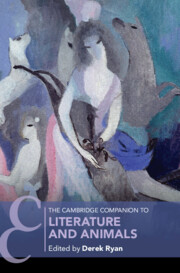Book contents
- The Cambridge Companion to Literature and Animals
- The Cambridge Companion to Literature and Animals
- Copyright page
- Contents
- Figures
- Contributors
- Introduction
- Part I Literary Periods
- Chapter 1 Middle Ages
- Chapter 2 Early Modern
- Chapter 3 Eighteenth Century
- Chapter 4 Romantic
- Chapter 5 Victorian
- Chapter 6 Modernist
- Chapter 7 Contemporary
- Part II Contexts and Controversies
- Select Bibliography
- Index
- Cambridge Companions To …
Chapter 7 - Contemporary
Animal Form and Zoontology
from Part I - Literary Periods
Published online by Cambridge University Press: 26 October 2023
- The Cambridge Companion to Literature and Animals
- The Cambridge Companion to Literature and Animals
- Copyright page
- Contents
- Figures
- Contributors
- Introduction
- Part I Literary Periods
- Chapter 1 Middle Ages
- Chapter 2 Early Modern
- Chapter 3 Eighteenth Century
- Chapter 4 Romantic
- Chapter 5 Victorian
- Chapter 6 Modernist
- Chapter 7 Contemporary
- Part II Contexts and Controversies
- Select Bibliography
- Index
- Cambridge Companions To …
Summary
This chapter proposes that the representation of animals in contemporary writing is best understood as “literary zoontology”: the portrayal of animal existence, and of sociality among animals and humans, as an intertwined story of the reality of more-than-human life and literary meaning. The framework adopted is principally literary-theoretical. By analyzing some key contemporary critical approaches to making sense of animal life, I argue for attention to the “animal form” of contemporary texts, in which literary animal lives are not dissected into their actual and imaginary, embodied and aesthetic, parts. The analysis then opens onto a key example: George Orwell’s Animal Farm. The animal form of Animal Farm configures together what are normatively understood as essentially different “kinds” of living and being: human and animal, species and individual, speculative and actual, aesthetic and real. Indeed, focusing through the lens of literary zoontology offers us new ways to discover Orwell’s literary animals within the history of human-animal relations. As such, it is one way that literary reading can take us beyond the human-animal divide.
- Type
- Chapter
- Information
- The Cambridge Companion to Literature and Animals , pp. 132 - 150Publisher: Cambridge University PressPrint publication year: 2023

